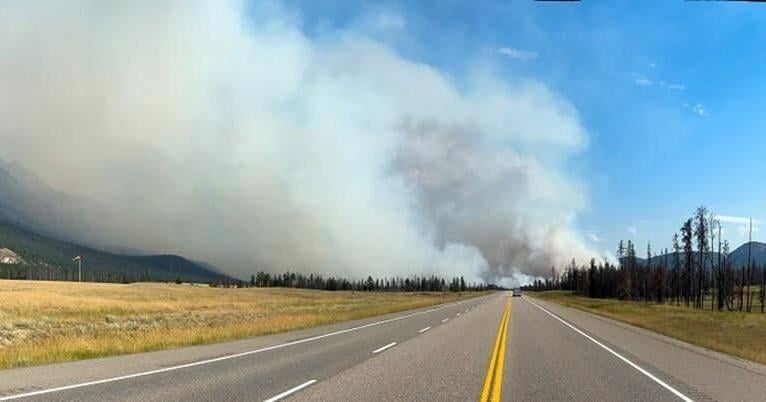Here is a roundup of stories from CanadaNewsMedia designed to bring you up to speed…
Jasper wildfires burn buildings, chase out crews
A fast-moving wildfire has hit Jasper, Alberta, destroying buildings and chasing some wildland firefighters away with dangerously poor air quality.
The social media account for Jasper National Park says the fire has caused significant loss within the townsite, but the specific locations or neighbourhoods affected are not being reported.
On the social media platform X Wednesday night, the account for Fairmont’s Jasper Park Lodge says the flames have reached the hotel’s grounds, but the extent of damage, if any, is not yet known.
As the flames consumed more fuel, officials say the air quality dropped to dangerous levels, prompting fire crews without breathing apparatus to evacuate to the nearby community of Hinton.
Cool change brings respite hope in B.C. firefight
Firefighters in British Columbia are expecting the warmer-than-usual weather to ease off today, fueling hope for more respite in their battle against more than 400 blazes.
The BC Wildfire Service says cooler temperatures and rain in the north slid into the central Interior on Wednesday, moving the mercury closer to seasonal norms for the first time in a month.
The wildfire service says the favourable forecast is giving crews a chance to make even more progress.
In the past week, at least 239 fires have been extinguished, and at least 124 fires have been brought under control.
However, about 260 fires continued to burn out of control as of late Wednesday.
Canada’s premiers consumed by natural disasters
As Canada’s premiers reckoned with housing, health care and their contentious relationship with Ottawa during meetings last week in Halifax, many of them remained consumed by climate change-related natural disasters that have only escalated since they returned home.
“It’s not lost on us that emergency preparedness for natural disasters is more important than ever,” Nova Scotia Premier Tim Houston said in his closing remarks on the final day of the Council of the Federation conference.
This summer has so far included multiple flash floods, including one this month in Nova Scotia that killed a 13-year-old boy, and wildfires across the country that have resulted in the destruction of property and the evacuation of thousands of residents.
Unclaimed bodies are piling up in Newfoundland
A funeral director in St. John’s says the bodies piling up in freezers at Newfoundland and Labrador’s largest hospital likely belong to people whose loved ones couldn’t get enough government help to pay for a funeral.
John Anderson, director and embalmer at Caul’s Funeral Home in St. John’s, N.L., says the province offers funeral homes too little money to provide services for people on income assistance and old age security programs.
He says people become frustrated with how little funeral homes can provide them, and some just walk away and leave their loved ones sitting in freezers.
Emails obtained by the provincial NDP through access to information legislation show health officials warning in November 2021 that morgues and freezer units brought in to handle overflow were at capacity.
Nygard sentencing hearing to continue today
The lawyer representing former fashion tycoon Peter Nygard is set to continue her submissions at his sentencing hearing in Toronto today.
Gerri Wiebe stressed the importance of factoring in her client’s age and health as she began her arguments Wednesday.
Nygard, 83, was found guilty last November of four counts of sexual assault, but he was found not guilty of a fifth count as well as one of forcible confinement.
The charges stem from allegations dating from the 1980s until the mid-2000s.
Prosecutors have said they are seeking a sentence of 15 years, minus credit for the time Nygard has already spent in custody.
Survival ‘down to the wire’ for endangered orcas
The southern resident killer whale known as Tahlequah captured global sympathy in 2018 when she pushed the body of her dead calf for more than two weeks in waters off British Columbia’s south coast.
Some scientists and advocates called the scene a display of public grief.
But the impact of the loss went beyond Tahlequah. It was a significant blow to the entire population that numbers just 74 individuals.
Recent research suggests a baseline rate of population loss of roughly one per cent per year — based on modelling and 40 years of observations — putting the whales on a path toward a “period of accelerating decline that presages extinction.” Even that rate of loss is “optimistic,” the research says.
The study lends urgency to calls by a coalition of environmental groups for the Canadian government to reverse its decision not to issue an emergency protection order for the whales, in the face of what may otherwise be inexorable decline.
—
This report by The Canadian Press was first published July 25th, 2024
